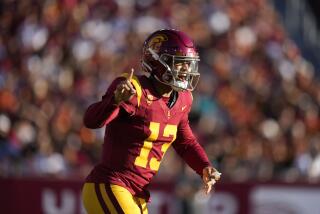AUSTIN POWERED
- Share via
AUSTIN, Texas — Ricky Williams told the story between chomps of cheeseburger at the “Hula Hut,” an Elvis-meets-Sam Houston motif eatery replete with Hawaiian-shirted waiters and blaring ‘60s riffs.
Never mind how many “spurs-that- jingle-jangle-jingle” miles Williams was removed from the sands of Waikiki.
Williams’ tale would be a tear-jerker for any follower of USC.
As he sipped iced tea, Williams explained how he was set to become the next great USC tailback. He told then-coach John Robinson it was a done deal, save one last look-see recruiting trip to Texas.
Williams grew up in San Diego, surrounded by silver bells and cockle shells.
What were the odds of his falling for a land-locked school deep in the heart of Texas?
“I came to Austin and I fell in love with it,” Williams said.
To boot, Williams came home with Texas trinkets and a cowboy hat.
The hardest part was breaking the news to Robinson.
“He was really crushed,” Williams recounted. “He liked me a lot, but I guess I didn’t see that. I thought he was just recruiting me.”
Another hankie, Trojan fans?
Four years later, as the ousted Robinson flings darts at Mike Garrett posters, Williams makes his Southern California collegiate debut as the Heisman Trophy-chasing tailback from the University of Texas, which plays UCLA in the Rose Bowl on Saturday.
It will be as a Longhorn, not a Trojan, that Williams takes on Bruin quarterback Cade McNown in an early season High Noon showdown and revenge-seeking rematch of UCLA’s 66-3 victory last year in Austin.
Vengeance wasn’t the motive for Williams’ turning down top-10 NFL money to return for his senior season, but it’s safe to say Sept. 12 has long been circled on the dorm calendar.
“It killed our whole season,” said Williams, whose team finished 4-7. “It made it so hard for us to be Texas. In the past, teams would lie down for us, we’d go in and they knew we were going to win. But after [UCLA], it showed we weren’t that tough.”
The defeat and resulting Longhorn fadeaway cost Williams a shot at the Heisman. Despite leading the nation in rushing with 1,893 yards and scoring with 152 points, Williams finished fifth in the balloting.
Only the top four vote getters are invited to the ceremony at New York’s Downtown Athletic Club.
“I was upset about that, really upset,” Williams said.
The UCLA loss ultimately cost coach John Mackovic his job, led to near panic within Austin city limits and provoked the hiring of turn-around artist Mack Brown, who dared make football an alternative at basketball-crazed North Carolina.
It was a dark December.
Williams returned home after winning the Doak Walker Award as the nation’s top running back convinced he was going to turn pro, every logical bone telling him to do so.
But convention has never been Williams’ bag, as his pierced tongue, Bob Marley dreadlocks and Mighty Mouse tattoo suggest.
Williams says he changed his mind two or three times daily until the Jan. 8 news conference at which he teased the congregation into thinking he was leaving--”I want to thank my teammates for helping me achieve my personal goals”--before saying he was coming back.
Never in Texas had there been so much clamor for a walk-on.
That’s right, Williams has never been on scholarship thanks to the Philadelphia Phillies, who paid for his education as part of his $50,000 signing bonus out of high school. Williams has played four seasons in the Phillie organization, in the familiar role of brilliant-outfield-prospect-who-has-trouble-hitting-a-curveball.
How would Williams mesh with the new coach?
Mack Brown has a rule against players wearing long hair. Yet, understanding what Williams meant to the Longhorns, Brown made an exception and all but said, “Nice hair, mon.”
Brown needed only to know that Williams would be a leader in the new regime.
“You’re always concerned about having a superstar in your first year that might take advantage of the situation,” Brown said. “I told him, ‘You really got us handcuffed, because you’re up for the Heisman and if you really didn’t want to work there’s nothing we can do because we really don’t want to bench you.’
“We really needed him to step up and be a role model. And he’s been great.”
Ricky Williams has always been a tough first read. The hairdo and body markings make it hard to get past the cover.
Yet, if you get beyond the hole in his tongue--a lot of people can’t--you’d find a basically shy man who has done more giving than receiving.
How many kids at age 6 have had to say, “Mom, it’s tough being the man of the house.”
But Williams was the man. His parents were divorced when Ricky and his twin sister, Cassie, were 5. Sandy, his mother, worked days and went to night school.
“It was hard on all of us,” Cassie said. “But early on, he took responsibility as the man of the house. And it was more than taking out the trash.”
The Williamses were clinical-study latchkey kids. Sandy would leave Ricky, Cassie and little sister Nisey home alone from 6 to 10 p.m. while she attended school.
“We took turns cooking dinner,” Cassie said. “It was a lot of macaroni and cheese.”
Sandy left the kids with a list of do’s and don’ts. And it was up to 6-year-old Ricky to keep order.
Ricky doesn’t think it was a big deal.
“I knew I had to do it,” he said. “I kind of liked it. I didn’t really have a boss, you know? I was kind of on my own.
“I knew the rules. Don’t open the door to strangers. And we had a special ring to know if it was my mom calling. It would ring twice, then she’d call back.”
One night, while Ricky was roughhousing with Nisey, he cracked his head open on a living room table.
Williams: “I just stopped the bleeding and waited until my mom got home and she took me to the hospital.”
Get beyond the dreadlocks and discover a side of Williams that used his signing bonus to assist his mother and sisters.
“He helped pay my tuition to Southwest Louisiana,” said Cassie, who later transferred to Texas. “He never told me he did it.”
A side of Williams that moved his mother and sister to Austin.
A side of Williams that isn’t as tough as he looks.
While starring at San Diego’s Patrick Henry High, Williams used to sleep with his helmet.
He has always had big dreams.
“I don’t want to be normal,” he said. “People know who I am when I walk into a room. I like that.”
Williams can’t imagine fame and fortune corrupting him.
He is working toward a degree in education and predicts in 20 years you will find him teaching grade school, probably in Monterey, playing in a 40-year-and-older baseball beer league.
Not long after Williams won the Doak Walker Award, the real Walker was paralyzed in a skiing accident. Williams has since written Walker more than 20 letters of encouragement.
Granted, it was tough for a kid who was raised on Ramen noodles to turn down a $20-million NFL contract.
But there was unfinished business in Austin.
Williams, dubbed “Little Earl” for his running resemblance to Earl Campbell, Texas’ only Heisman Trophy winner, needs only 74 yards against the Bruins to break Campbell’s Texas record of 4,443 rushing yards.
Williams, 6 feet and 225 pounds, knew little of Campbell when he arrived in Austin.
“I was born the year he graduated college,” Williams said.
He knows about Campbell now.
“I wanted to watch film and see what all the hoopla was about,” Williams said. “I watched a lot of film. I was impressed. He was punishing.”
Williams tried to run like Campbell as a freshman and soon realized it was not a style suited for longevity. So he started putting moves from other backs into his repertoire.
Williams has a knack of being able to watch a move on film and then take it straight to the field.
He picked up a start-and-stop maneuver from the Detroit Lions’ Barry Sanders.
“He said he used to practice by running into a wall, and then stop right before the wall,” Williams said.
Williams has a Marcus Allen move: “Go slow until you see the hole and then burst into the hole.”
And he picked up a dandy in high school while watching Marshall Faulk at San Diego State.
“It’s a toss play to the sidelines,” Williams said. “You fake out and then cut right in. That’s really a good move, because so many times you’re out there on the corner, one on one.”
Williams isn’t old enough to remember some of the greats.
“How good was Franco [Harris]?” he asked a reporter. “What about Walter [Payton]? What made him so good?
“Now, [Eric] Dickerson. I thought he was really good. I went and saw him when the Raiders played the Chargers. He was huge.”
Imagine Ricky Williams as an amalgamation of all his influences.
Williams also has his sights set on what was believed to be an untouchable record: He began this season needing 1,928 yards to break former Pittsburgh back Tony Dorsett’s 22-year-old NCAA rushing mark of 6,082 yards.
All the backs with a chance to break the record--Georgia’s Herschel Walker, Faulk, Iowa State’s Troy Davis and Texas Tech’s Byron Hanspard--turned pro after their junior seasons.
Williams needs to average a little more than 175 yards in 11 games to break the record, and is well ahead of pace after his 215-yard, six-touchdown performance in Texas’ opener Saturday against New Mexico State.
Williams needs four more 200-yard rushing games to break Allen’s NCAA record of 11.
Wouldn’t that be like Williams, breaking more USC hearts?
There is also a score to be settled with UCLA, although Williams downplays his Heisman matchup against McNown.
“It’s going to be more of a showdown of what they’re made of and what we’re made of,” Williams said.
But the memory of the UCLA defeat permeates the Texas locker room.
Williams met McNown at a postseason function last year and said the worst part was how gracious McNown was in victory.
It might have been better had McNown been a jerk about it.
“There was nothing to talk about,” Williams said. “I couldn’t say anything.”
Until now.
(BEGIN TEXT OF INFOBOX / INFOGRAPHIC)
By the Numbers
RICKY WILLIAMS BY SEASON
*--*
Year G Car Yds Avg YPG TD 1995 12 166 990 6.0 82.5 8 1996 12 205 1,272 6.2 106.0 12 1997 11 279 1,893 6.8 172.1 25 1998 1 36 215 6.0 215 6 Career 36 686 4,370 6.4 121.4 51
*--*
TEXAS’ TOP RUSHERS
*--*
Player (Years) Car Yds Avg TD Earl Campbell (1974-77) 765 4,443 5.8 40 Ricky Williams (1995-) 686 4,370 6.4 51 Chris Gilbert (1966-68) 595 3,231 5.4 28 Roosevelt Leaks (1972-74) 555 2,923 5.3 26 Jam Jones (1978-81) 645 2,874 4.5 27 Eric Metcalf (1985-88) 586 2,661 4.5 23 Jim Bertelsen (1969-71) 412 2,510 6.1 33 Adrian Walker (1989-92) 501 2,473 4.9 17
*--*
More to Read
Fight on! Are you a true Trojans fan?
Get our Times of Troy newsletter for USC insights, news and much more.
You may occasionally receive promotional content from the Los Angeles Times.







